-
News & Trends -
Sales -
Marketing Related Topics -
B2B Software Guides Related Topics -
Free Tools & Resources -
- About Us About Us


Salesforce is a sales-forward CRM that’s ideal for traditional sales teams with long cycles and a lot of direct contact with leads. It’s renowned for its powerful analytics engine, myriad customization options, and seamless automations. Companies are drawn to Salesforce’s depth and flexibility — and are willing to pay top dollar for it — but smaller organizations may find it overwhelming or unnecessary for their needs. Our Salesforce review will help you decide.
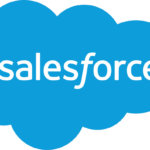
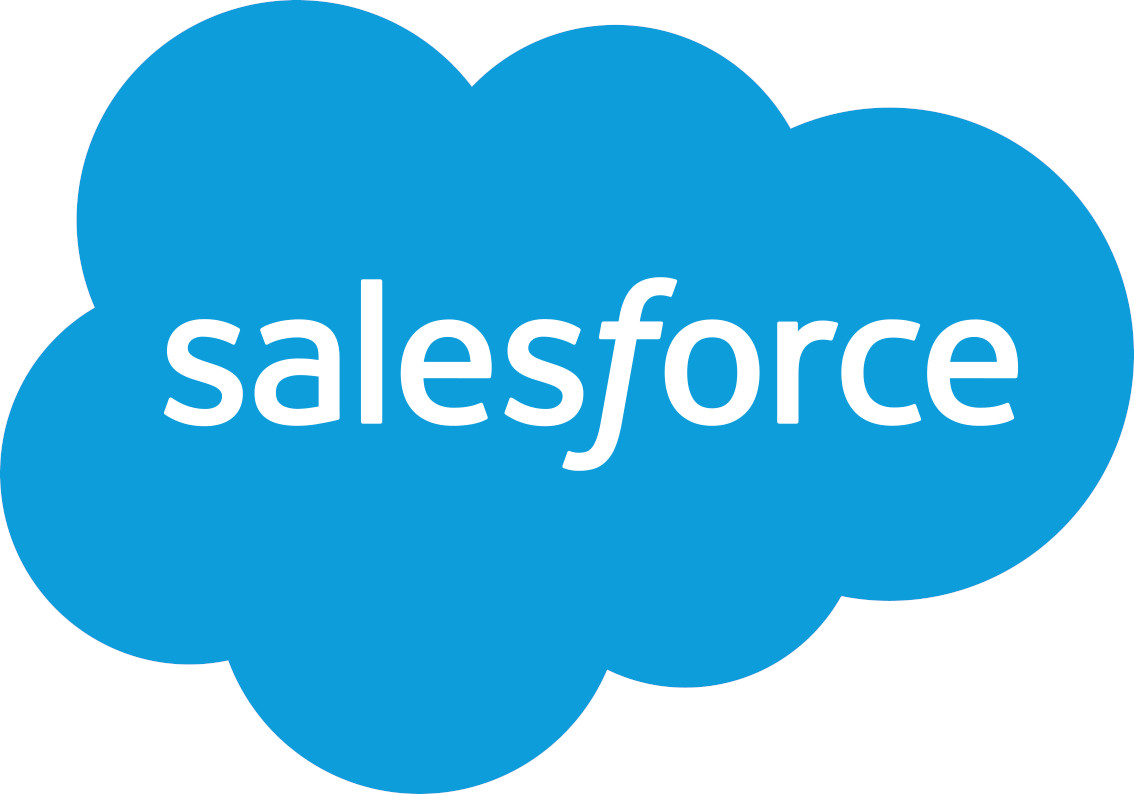
Salesforce is trusted by 150,000+ companies worldwide for its robust features and customization, powerful reporting engine, and wide range of sales automation functions. However, it can be complicated to learn and too robust for many organizations.
Ratings, pros, and cons aside, it’s also essential to consider specific situations where Salesforce excels — along with scenarios where it may not meet expectations. Continue reading to learn more about the platform’s use cases, pricing, key features, usability, and customer support, including what people think of the software and its CRM alternatives. Otherwise, skip down to see our scoring logic for different categories.
Salesforce is regarded by sales professionals as one of the best CRM software options on the market. Some of the reasons for Salesforce’s popularity include a powerful reporting engine, vast customizations, and an excellent mobile app experience that’s good for larger sales teams or salespeople with longer sales cycles that require extensive lead nurturing.
Click below for a comprehensive list of Salesforce CRM use cases:
If Salesforce sounds like a good option for you, we recommend exploring Salesforce’s entire suite of features and reviewing its pricing structure to ensure it’s in line with your sales goals and budget. Then, you'll be able to make a fully informed decision, as well as use Salesforce's 30-day trial offered across all tiers.
Despite its reputation as an industry-leading CRM, Salesforce will not be the ideal solution for every organization — namely if you’re a small company that’s unfamiliar with the intricacies of CRM software or don't need a robust solution that is powerful but might be complicated to learn.
Below are the specific situations where Salesforce might not be right for you:
If Salesforce CRM doesn't seem like the best solution for you, take a look at our list of the best CRM software. There, you’ll find a detailed breakdown of the top CRM platforms, one of which may better align with your intended use case and budget. You can also jump down to check out our list of the best alternatives to Salesforce, specifically.
Salesforce has four tiers to suit teams of various sizes and needs. The entry-level Salesforce Starter costs $25 per user per month for custom reporting, pipeline management tools, and marketing campaign features. Larger companies should consider Salesforce Professional and higher tiers to unlock advanced functions such as collaborative forecasting, lead scoring, and approval automation. Read on for a full breakdown of Salesforce pricing:
| Starter | Professional | Enterprise | Unlimited | |
|---|---|---|---|---|
| Annual Plan Monthly Rate | $25 per user, per month | $80 per user, per month | $165 per user, per month | $330 per user, per month |
| Monthly Plan Monthly Rate | N/A | N/A | N/A | N/A |
| Free Trial | 30 days | 30 days | 30 days | 30 days |
| Key Features | Lead and opportunity management, custom reports and dashboards | Case management, collaborative forecasting, campaign influence | Approval automation, advanced reporting, unlimited record types | 24/7 support, unlimited custom apps, sales engagement and insights |
| Workflow Rules | Up to 5 rules | Up to 5 rules | Unlimited | Unlimited |
| Campaign Influence | N/A | 3 campaigns per opportunity | 5 campaigns per opportunity | 5 campaigns per opportunity |
Salesforce also offers over 100 add-ons that’ll either introduce new CRM features or augment existing ones. Most of these add-ons are priced per user, per month and can cost anywhere from $2.00 for very basic functions to tens of thousands of dollars for sophisticated data analytics. Below are some of Salesforce’s most popular add-ons.
Starter to Enterprise users can purchase this add-on for $25 per user, per month (Inbox is included in the Unlimited tier). Reps can sync contact data with a company’s email and calendar as well as leverage its intelligent sales assistant for real-time scheduling. You can also manage customer communications from any device, capture data such as email insights, and read receipts automatically.
Business leaders who are seeking an industry-specific CRM out of the box should know that Salesforce offers multiple versions of its base software outfitted with features related to finance, healthcare, education, and other sectors. As a result of these niche functions being included, prices tend to skew much higher for these specialty editions of Salesforce.
Salesforce is known for its deep functionality. It allows businesses to build viable pipelines, pull all types of reports, automate various tasks, develop spot-on sales forecasts, and so much more. The following are among Salesforce’s most notable core CRM features:
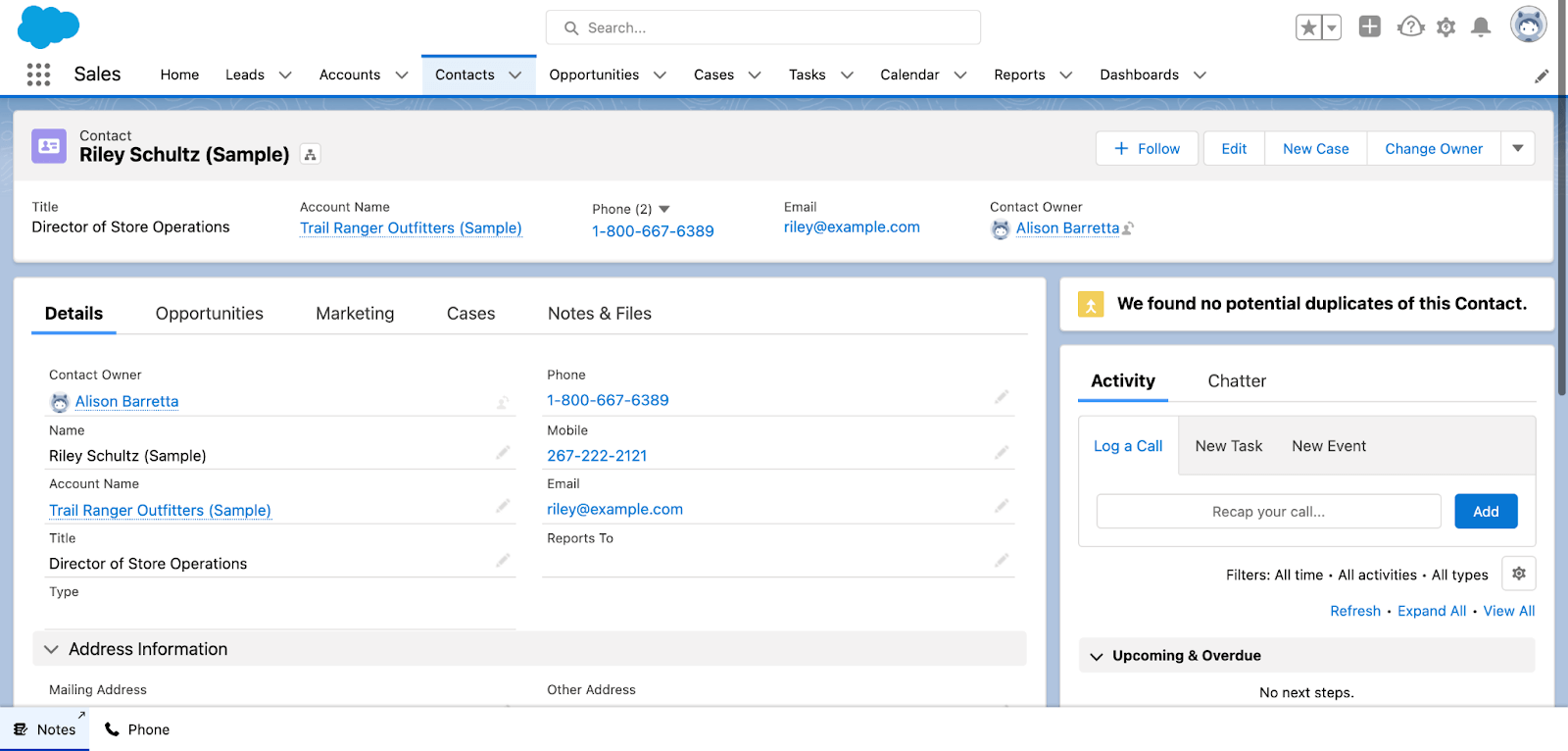
Salesforce provides a full view of its leads and clients, detailing past activity to communication history. Contact profiles are created by automatically extracting data from Gmail or Outlook, and Salesforce can also pull social media data to provide further insight into what contacts say about a company online. All of this is compounded by an intuitive search engine that pulls up data quickly, no matter how broad or niche the keyword.
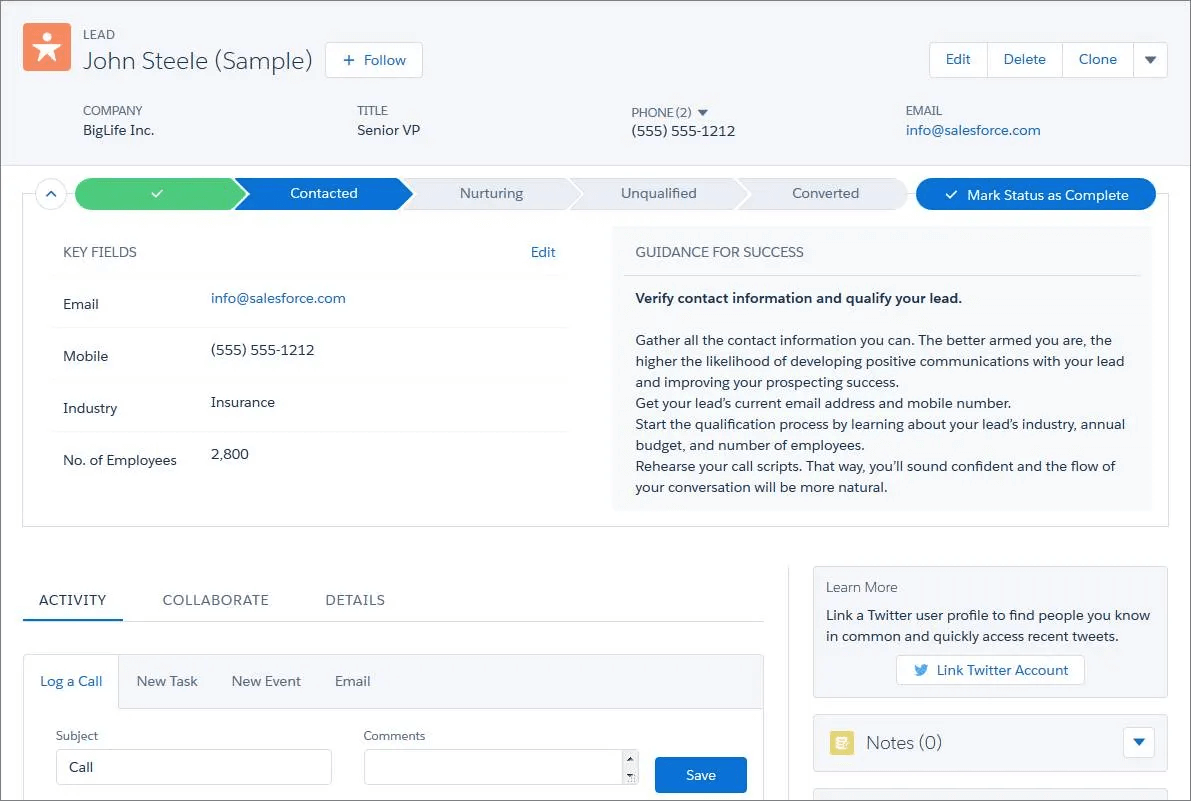
For managing and nurturing leads, Salesforce's Sales Path feature allows users to track all lead info and activity in one place. Team leads and reps can access relevant insights and then take the appropriate next steps in converting leads into customers. Salesforce also helps teams track impactful sales metrics, so businesses can customize and organize reports onto one visual dashboard to see which channels are bringing in the most prospects.
Learn more about the types of lead management tools present in Salesforce and other popular CRMs in our list of the best lead management software.
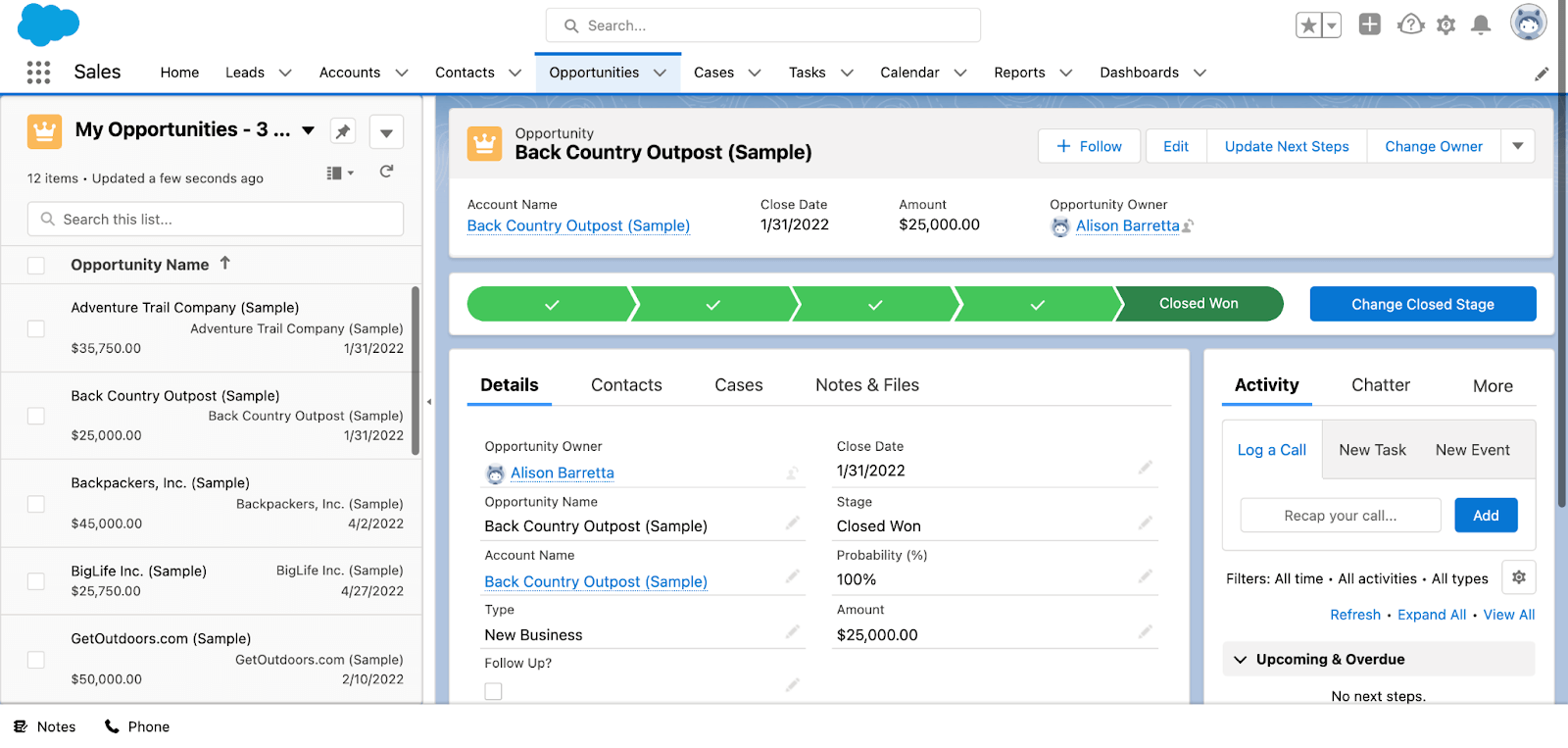
Salesforce splits pipelines into leads and opportunities, so it's easy to track contacts and deals no matter which stage of the sales process they're in. From there, quick search filters and real-time updates help sales reps find and focus on opportunities that need extra attention. Teams can also monitor the health of their pipelines via detailed reports and dashboards, which help businesses align their sales and marketing goals and analyze them together.
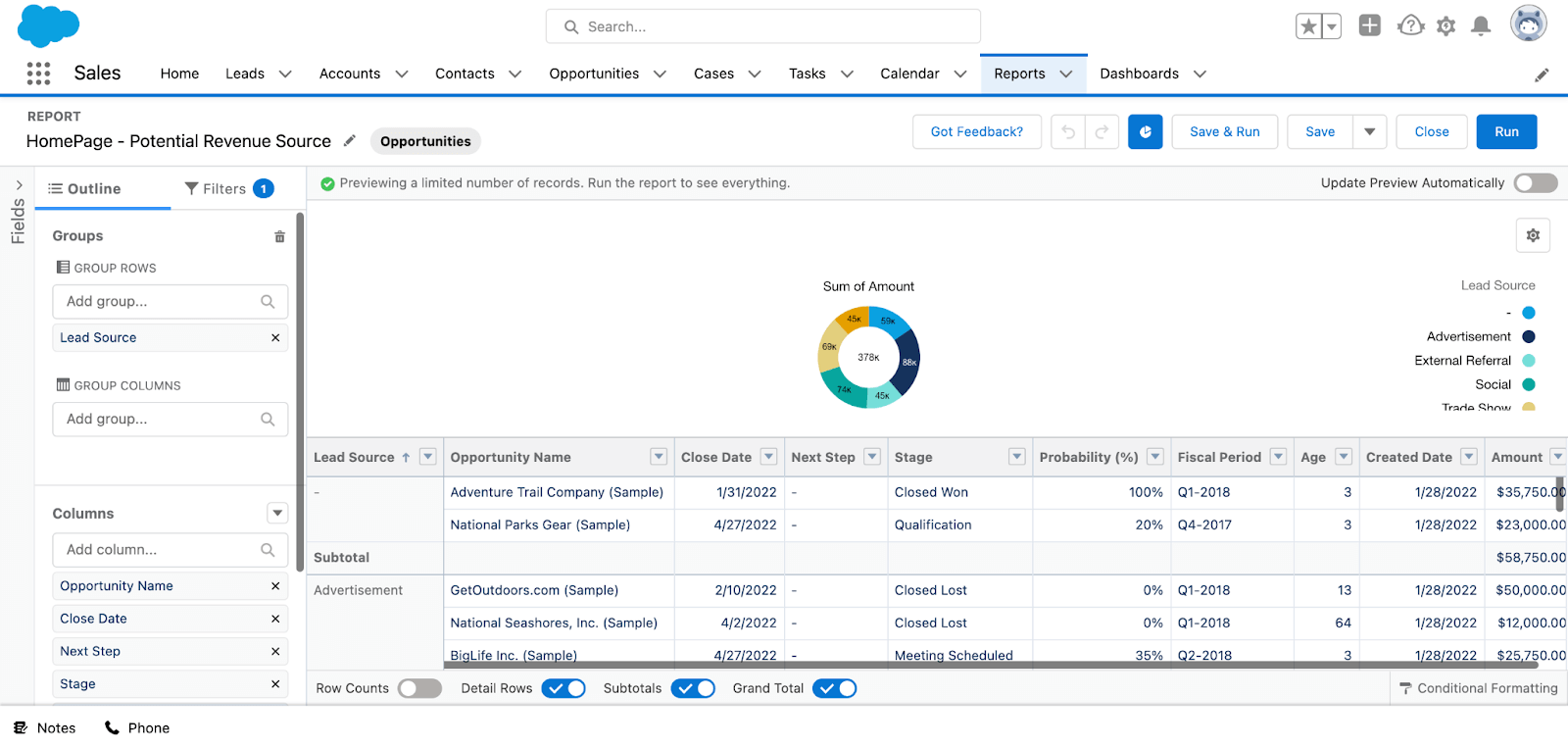
Every Salesforce plan can help you generate any type of CRM report, including access to pre-made and custom reports, which users can build via a simple-to-use drag-and-drop editor. Salesforce Professional and Enterprise up the ante by adding more variables, deeper analytics, and advanced features like cross-filtering and bucketing. Einstein GPT also connects your data with the generative capabilities of AI and large language models (LLMs).
Salesforce is known for its advanced reporting, so it’s highlighted in our article on CRM reporting, which explains how businesses can translate key data into an actionable resource.
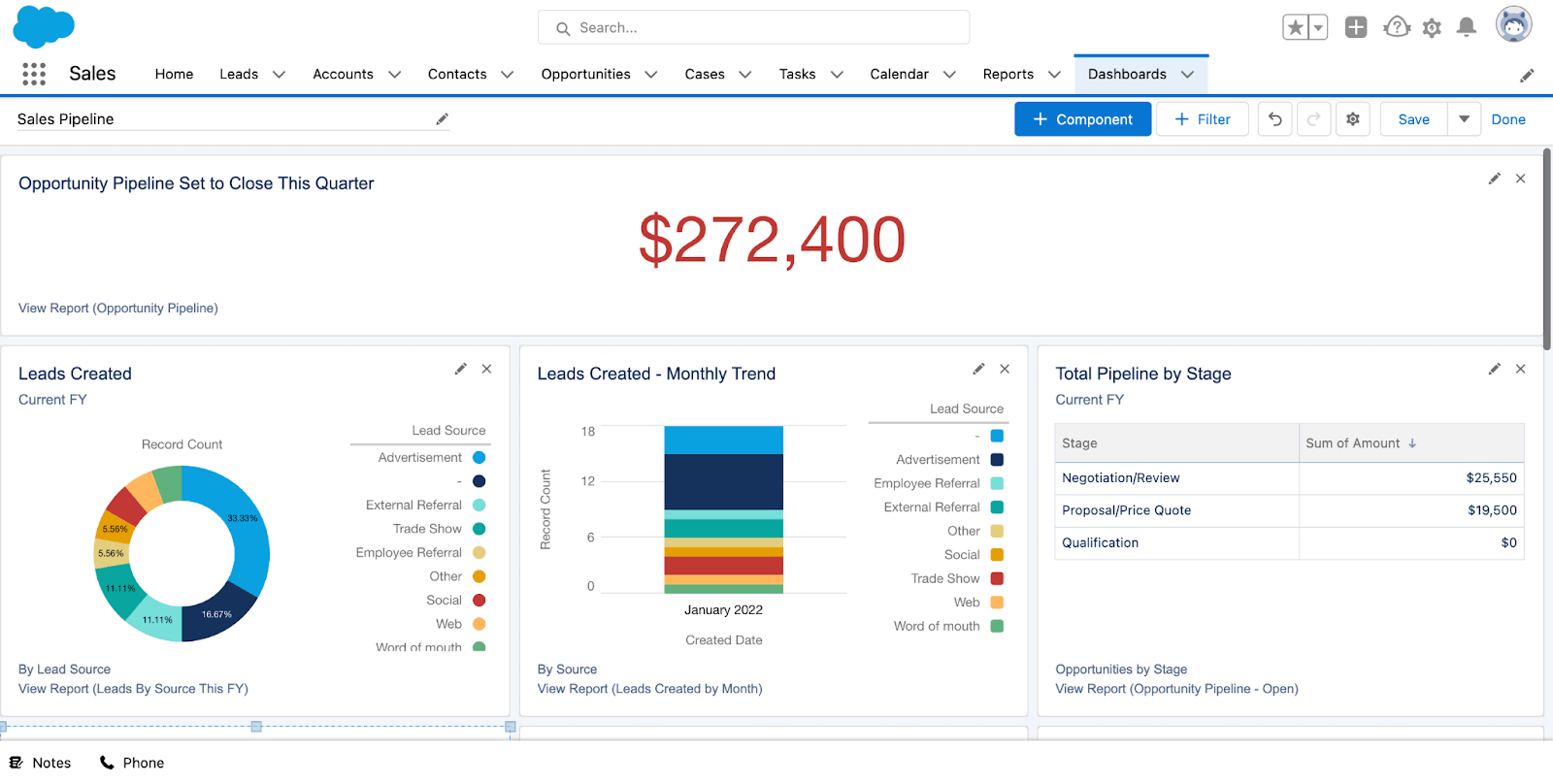
All Salesforce plans come with custom dashboards that can support up to 20 reports each. Creating dashboards is as easy as dragging-and-dropping components – from charts and tables to gauges and specific metric labels. Dashboards can be outfitted with KPIs related to sales team performance, deal management, or forecasting – and then shared either publicly or privately with relevant parties.
Discover the importance of building an effective CRM dashboard for your sales strategy, featuring examples directly from the Salesforce platform.
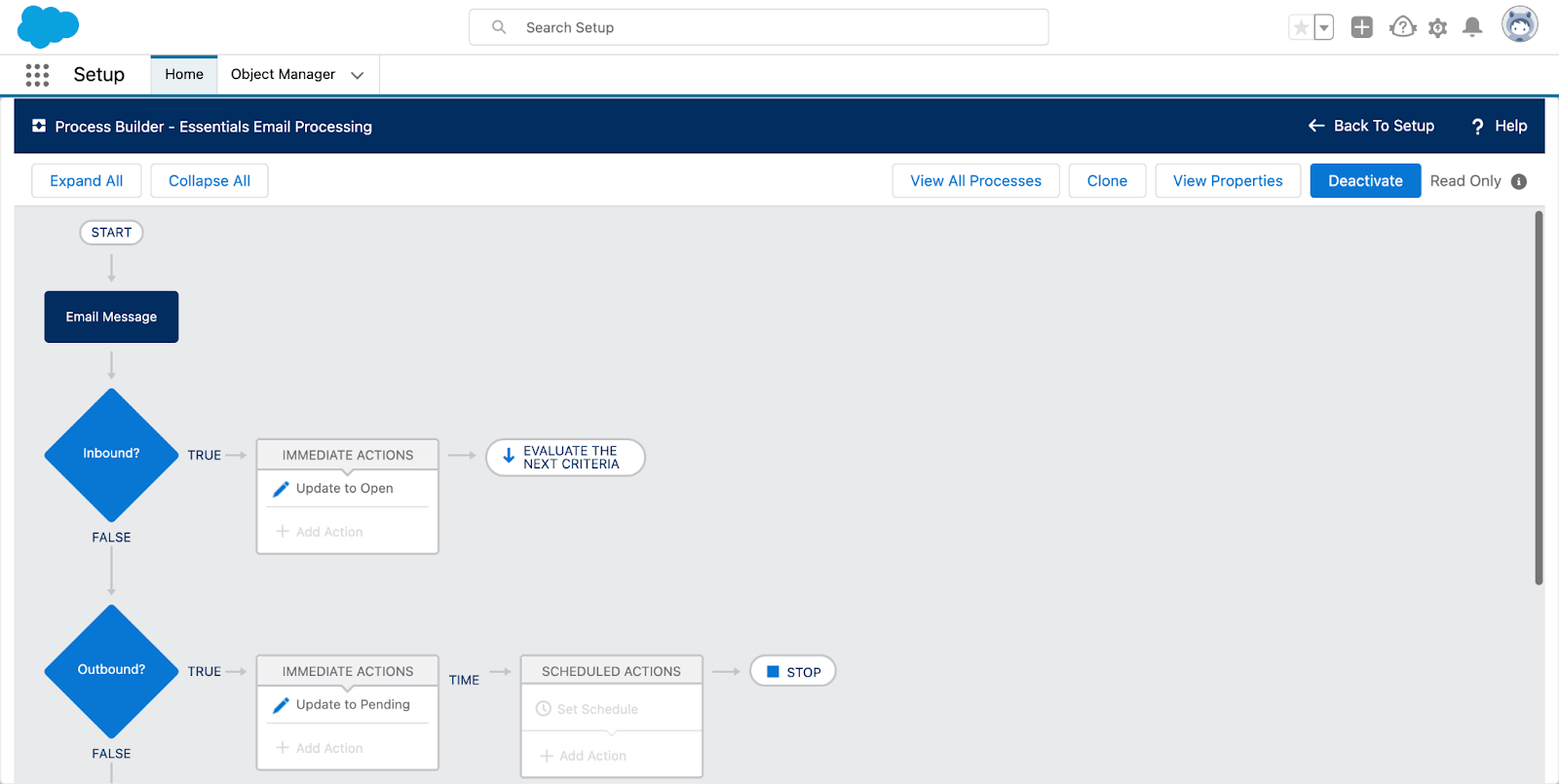
Salesforce is fantastic for enabling sales teams to automate as much of their process as possible – including admin work like expense reports and email follow-ups. Salesforce’s Lightning Flow Automation tool can also be used to create workflows that help reps take the best actions throughout all stages of the sales process. Salesforce Starter and Professional come with five workflow rules; Enterprise and Unlimited don’t impose any caps.
Salesforce’s automation is at the forefront of our guide to CRM automation, which shares in-depth info about how it works and which tasks are worth automating.
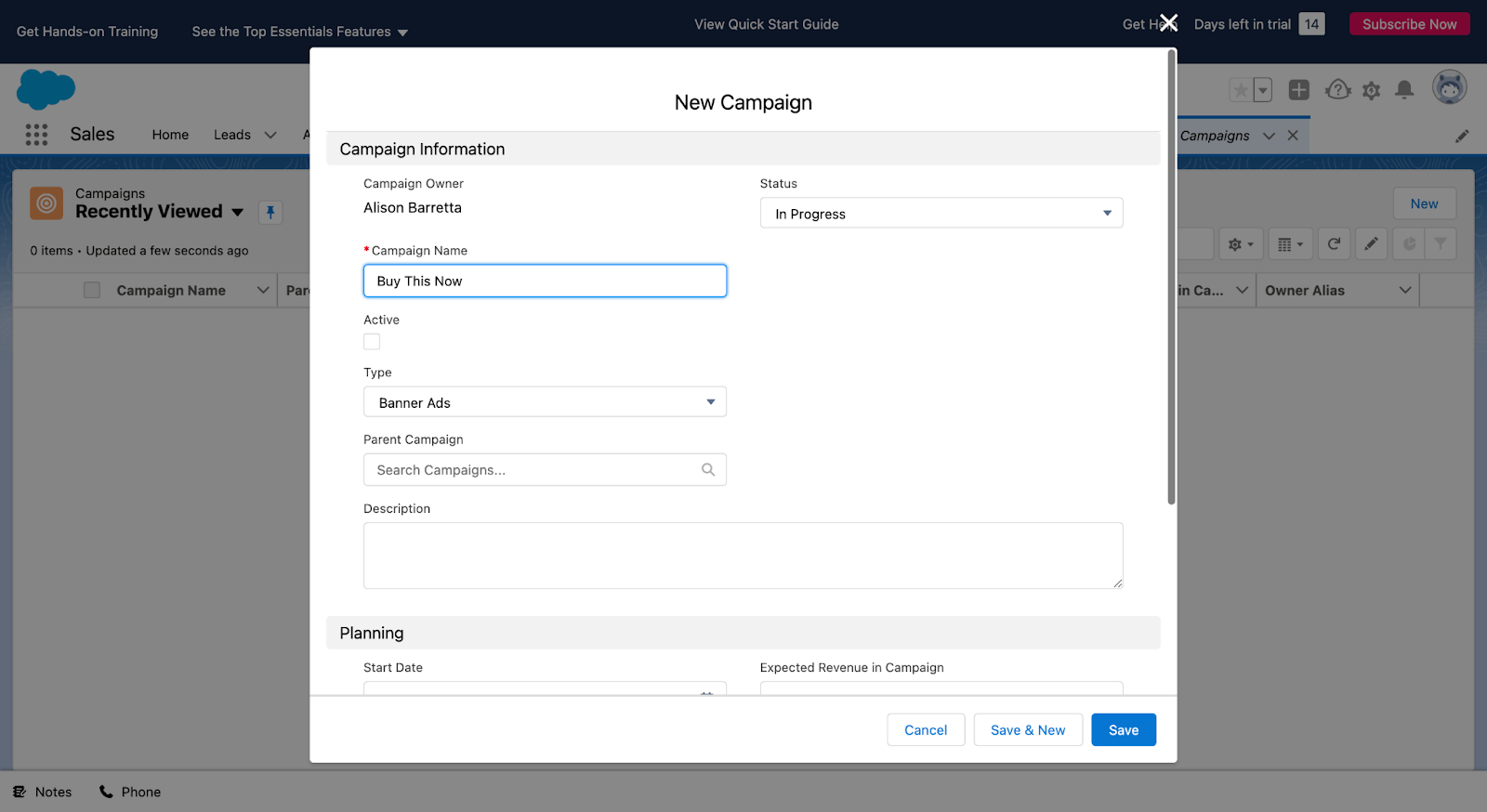
Every Salesforce plan offers campaign management tools that let marketing professionals plan and oversee inbound and outbound campaigns spanning email, ads, referrals, landing pages, and LinkedIn lead gen. Then there’s Campaign Influence, an advanced feature that pairs opportunities in the pipeline with relevant campaigns to show how marketing initiatives influence the bottom line for those deals.
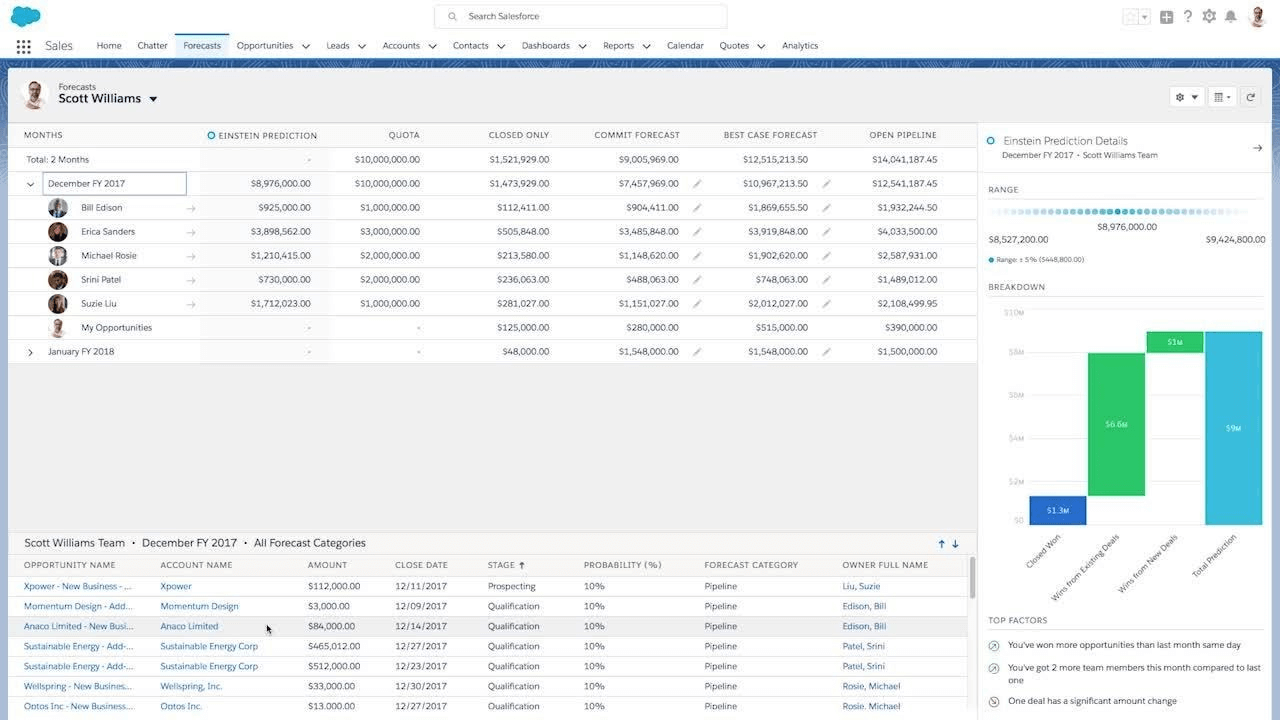
Salesforce includes collaborative forecasting with its top three tiers. It helps teams predict when deals will change status or close based on a pooling of real-time pipeline data. Advanced forecasting features in higher tiers add custom fields, opportunity splits, and territory management. Enabling the Sales Cloud Einstein add-on ($50 per user, per month) yields AI-powered predictions and insights.
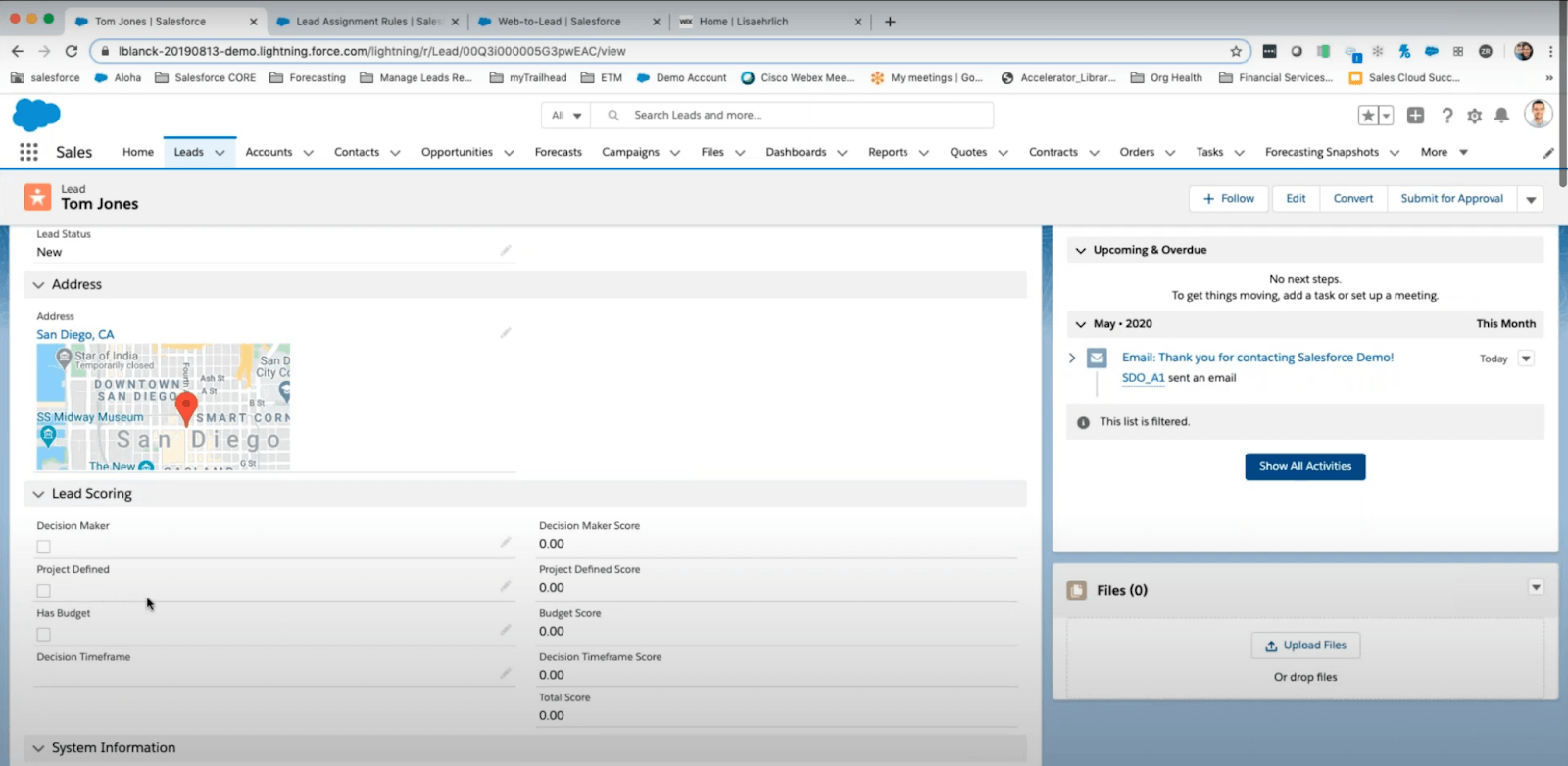
Salesforce will be of service to high-volume sales teams that need to quickly rank and distribute leads. After capturing leads via landing page or web form, Salesforce scores them based on configurable rules related to select demographics or behaviors. From there, sales managers can set assignment rules to route leads to the right reps. Users should note, however, that the lead scoring tool is only included in the Unlimited plan and available for purchase in Enterprise.
Upgrade your lead management strategy with Salesforce or any of the other best lead scoring software.
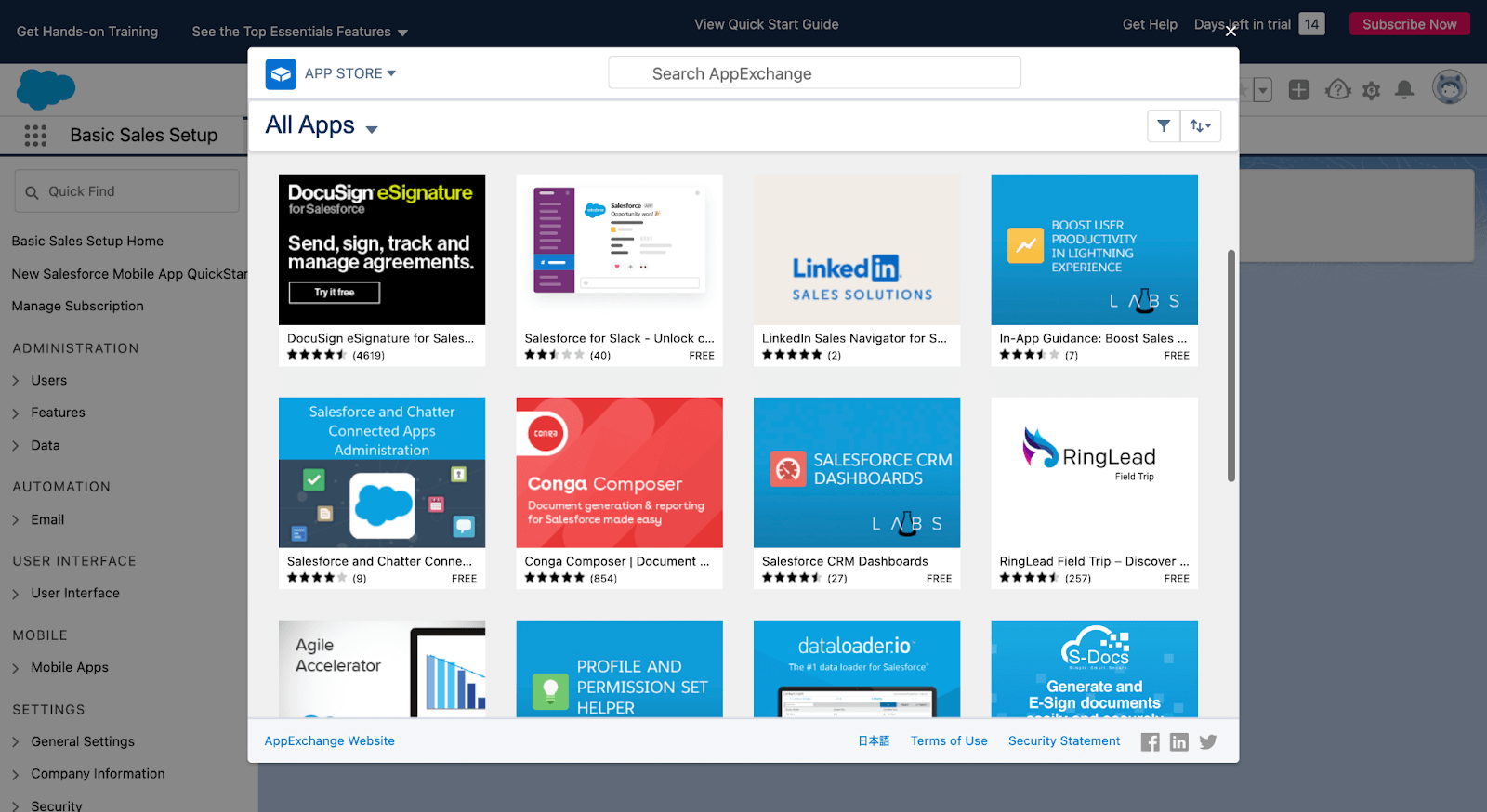
The Salesforce AppExchange boasts an impressive 7,000+ apps, many of them already used daily by most sales reps like Mailchimp, DocuSign, and Slack. Over 1,700 apps in the AppExchange are free; the rest require a subscription or other fee. Beyond the vast selection of pre-integrated apps, Salesforce allows companies to build their own apps on the Salesforce Web Services API (included with Enterprise and Unlimited).
Find out which integrations you should add to your CRM in our guide to CRM integration, which also includes detailed instructions on how to set them up using Salesforce as an example.
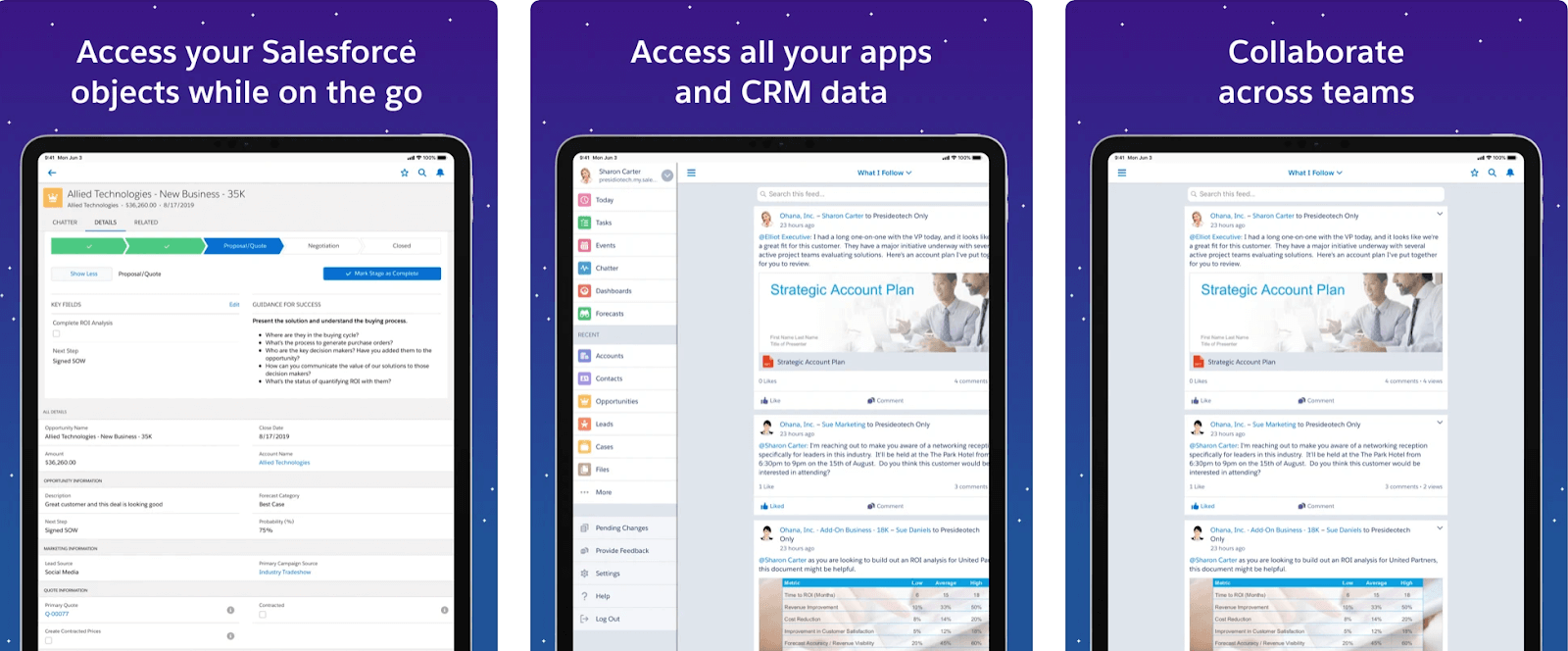
Take Salesforce on the go with its free mobile app for iOS and Android. Field pros who often struggle with finding a steady wireless connection on the road will appreciate the offline data mode, which caches data for dashboards, opportunities, and other key elements. The mobile app also offers AI insights powered by Einstein Analytics; an Einstein voice-activated search feature will roll out in the near future.
Read our guide to the best mobile CRM apps – which includes Salesforce – and understand why they stand out from the pack.
Salesforce's first tier, Starter, offers the core features that many businesses need, and they can upgrade to a higher tier for even more functionality.
Salesforce boasts a rich suite of functionality plus the highest level of customization — which makes it one of the most difficult CRMs to master. It’s not beginner-friendly, and even seasoned CRM users need ample time to acquaint themselves with the ins-and-outs of Salesforce. On top of that, implementation is a tedious process that requires strict attention to detail, as any mistakes can yield troublesome errors once everything is up and running.
One way to work around potential onboarding and setup issues is to hire a Salesforce expert who is on-call for technical support and offers specialized guidance to teach employees how to use the platform to its fullest. Of course, such services do not come cheap and will have to be factored into an organization’s overall CRM budget. Alternatively, users can check out Salesforce Trailhead Academy and sharpen their skills via free, self-paced online courses.
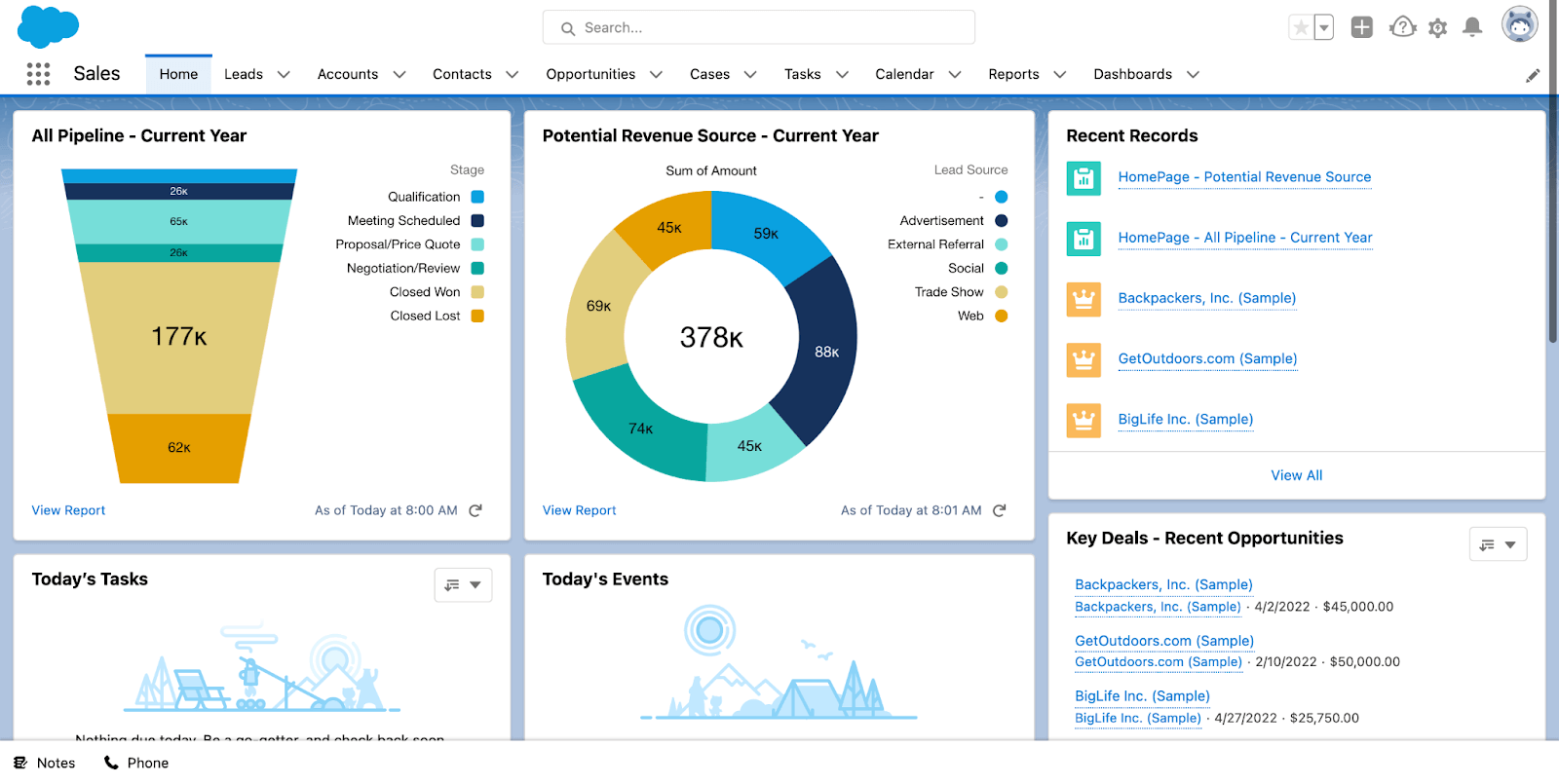
Standard with every Salesforce plan is access to email and live chat support during local business hours. Companies needing around-the-clock customer service (via email, chat, and phone) can upgrade to one of Salesforce’s Success Plans, which add benefits like specialized coaching, regular diagnostic checks, and account management assistance. Pricing for these (costly) support plans is available upon request.
As some user reviews note, Salesforce’s standard support team is not the most timely in responding to requests. However, for companies that simply can’t afford the cost of premium help, there is hope. Salesforce provides unfettered access to its community forums and knowledge base. These outlets are well-maintained and updated often — and thanks to the ubiquity of Salesforce, even the most niche queries are likely to have an answer.
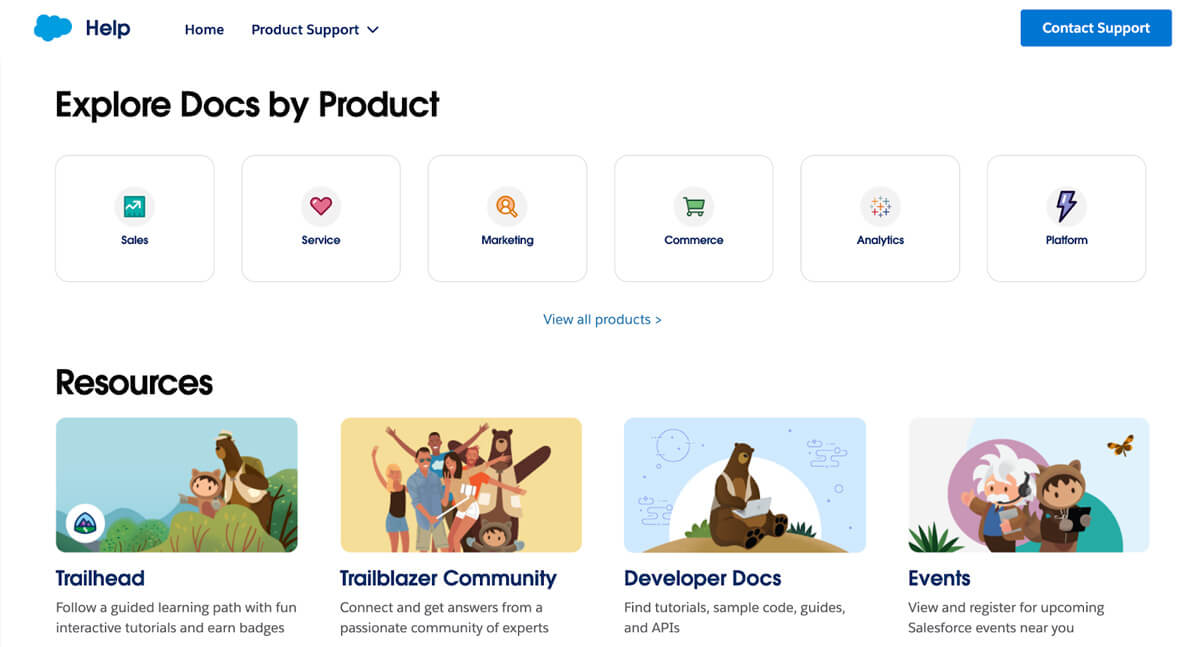
Naturally, a platform as popular as Salesforce has garnered plenty of user feedback. To help develop a sense of Salesforce’s public perception, we’ve scoured thousands of reviews and star ratings from the top three software aggregate sites: Capterra, TrustRadius, and G2.
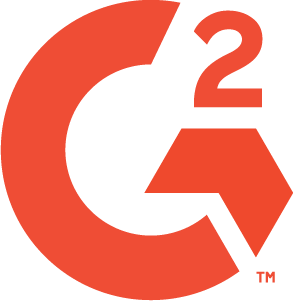 | ||
|---|---|---|
| 4.4 / 5 stars | 8.1 / 10 stars | 4.3 / 5 stars |
| 17,000+ total reviews | 3,000+ total reviews | 18,000+ total reviews |
Salesforce has admirable stats, but it’s worth going beyond the surface — what are the contributing factors to Salesforce’s above-average marks? We’ve taken a deeper dive into the reasons why professionals are keen to sing Salesforce’s praises (or call out its shortcomings).
Fans of Salesforce appreciate its flexibility. As one reviewer says, its high level of customization allows users to “ what's essential, not what Salesforce believes is significant.” Salesforce also receives a lot of praise for its wealth of functions — particularly its pipeline management, reporting, and sales automation. Some users admit that the broad selection of features may be overwhelming, but they also enable companies to solve almost any problem.
Critics of Salesforce cite its lack of usability, especially out of the box. Several reviewers caution that without a designated Salesforce expert to assist with setup and adoption, the implementation process can be harrowing. Interestingly, another common complaint about Salesforce is its complex feature set. While many companies like Salesforce’s feature-rich platform, small business owners find most of its tools extraneous.
Salesforce may be regarded as the gold standard of CRM software, but it won’t appeal to companies that have no need for such a weighty and pricey platform. Whether your business is seeking a beginner-friendly experience or looking for a more cost-efficient way to secure advanced CRM features, there are several viable options to consider. Below are five CRMs we believe are the best alternatives to Salesforce.
Freshsales is a top-rated CRM for salespeople, offering rapidly-scaling organizations AI-powered sales tools and other advanced features at a significantly lower cost than Salesforce. Premium plans range between $15 and $69 per user, per month and include insights generated by Freshsales’ Freddy AI engine. Freshsales also has a free-for-life version offering contact management, tasks and appointments features, a built-in phone, and more.
Freshsales is rated as our top alternative to Salesforce. You can check out our scoring in our editorially-independent review of the top Salesforce competitors and alternatives.
Are neither of the above options ticking the appropriate boxes for your business? Take a look at our list of the best Salesforce alternatives to learn more about Salesforce’s other main competitors’ use cases, pricing, and features.
To accurately score Salesforce, we defined the six main categories for businesses looking for a sales-forward CRM with advanced features and customization capabilities ideal for more complex sales processes. Within each category, we identified weighted subcriteria and assigned an overall score out of five to see how Salesforce performed across the six main categories.
We put emphasis on Salesforce’s pricing and core features, since these factors are essential for sales teams and businesses needing robust yet cost-effective CRM software. We then assessed the platform’s customization options (and third-party integrations) and advanced features. Finally, we assessed its ease of use and the support solutions it offered.
We evaluated the pricing of the CRM software's basic and enterprise tiers on both annual and monthly billing plans, the length of the free trial, available add-ons, and any free version offered.
We considered the CRM software’s features, including pipeline and opportunity management, reports, dashboards, and workflow automation.
Here, we evaluated Salesforce’s capabilities to customize pipelines and deal stages, reports, dashboards, and workflows. We also assessed how easily the CRM synced with free and paid third-party applications.
We considered whether Salesforce offered sophisticated capabilities such as forecasting management, lead and opportunity scoring, live chat, or AI tools.
We checked real user reviews on certified sites to learn more about Salesforce’s usability, as well as its knowledge base and training or certification programs offered.
We looked into the quality of customer service options offered by Salesforce via live chat, phone, email, and onboarding. We also considered user feedback across reputable sites to round out our scoring.
Salesforce is a sales-forward CRM that helps businesses manage their sales, customer service, and marketing activities with robust CRM functionalities. Its key features include a centralized database for storing customer data, strong sales and opportunity pipelines, and dynamic reports and dashboards. Additionally, Salesforce is popular with its workflow automation powered by Einstein GPT and vast customization options for industry-specific functions.
While Salesforce provides a comprehensive set of tools and functionalities that can be tailored to meet the specific requirements of almost any business, it might not be an ideal solution in every situation. If you’re a solopreneur or a small company that’s unfamiliar with the complexities of CRM, Salesforce can be overwhelming to set up and learn. Its premium tiers are also relatively more costly than competitors, which might not fit companies on a tight budget.
Salesforce offers a wide range of features and capabilities, but there are a few limitations to be mindful of. Some users might find the platform too complex to learn and require longer training to set up and use. Moreover, it doesn’t offer a free version and users need to upgrade to premium tiers or purchase add-ons for advanced features. Hence, small to medium businesses on a strict budget or those that don't need a lot of customization might consider alternative CRMs to Salesforce.
Salesforce is the preferred CRM for hundreds of thousands of users around the globe thanks to its vast range of cross-departmental features, countless customization options, and in-depth reporting. Salesforce’s status as an industry leader is an alluring selling point, but remember to do your due diligence. Seek out trusted Salesforce reviews (including this one) and sign up for a free trial or demo. Otherwise, see our list of the best CRMs if you want to consider other options.
This article was written by Alison Barretta and updated by Kezia Jungco.


Alison is a Philadelphia-based technology writer for Selling Signals. She has 15 years of experience in the digital space, and her specialties include comparison guides and reviews across CRM, ecommerce, and various SaaS products. In her free time, Alison has received two HubSpot certifications plus a TEFL certification, as well as leads an online martial arts learning program.

Selling Signals delivers actionable advice for sales and marketing professionals. Learn strategies that help you hit targets, strengthen customer relationships, and win more business. Get expert advice on lead generation, sales processes, CRM software, sales management, and account management directly to your inbox.
Property of TechnologyAdvice. © 2026 TechnologyAdvice. All Rights Reserved
Advertiser Disclosure: Some of the products that appear on this site are from companies from which TechnologyAdvice receives compensation. This compensation may impact how and where products appear on this site including, for example, the order in which they appear. TechnologyAdvice does not include all companies or all types of products available in the marketplace.